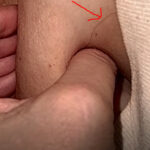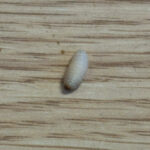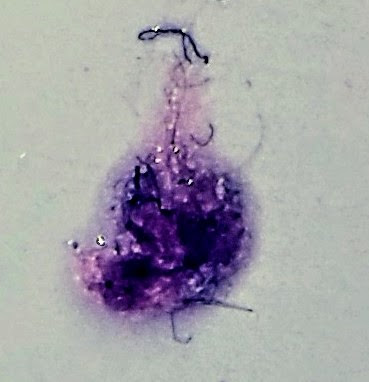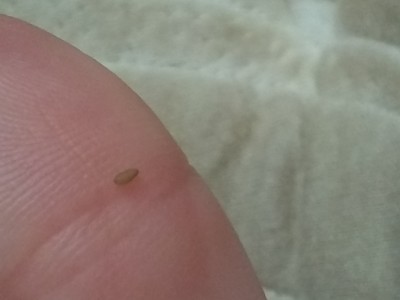Parasitic worms can affect humans and just about any type of animal at any given time. In fact, it is believed that at any given time the human body may be infected with dozens of different types of parasites. And, an any given time your dog can have any number of parasitic worms in his system, such as the half-inch-long hookworm or a tapeworm as well. Some parasites (human or dog) are microscopic while others are quite visible to the naked eye. Some parasites are found more often in animals, for example, the bloodworm typically infects horses, and others may affect humans more often, such as the pinworm, which can infect the human body for decades without being detected. Continue reading to learn more about the types of parasitic worms that affect humans, and the types that affect dogs.
Parasitic Worms in Humans
In all, there are more than 3,200 types of parasites in existence today. They are divided into the following categories: Cestoda, Nematoda, Protozoa, and Trematoda. Just a few of the different types of parasites that may infect humans include: tapeworms, (Cestodes); hookworms, pinworms, and roundworms (Nematodes); giardia (Protozoa); and flat worms, (Trematoda).
The most common type of parasitic worm found in humans is the roundworm. It is estimated that one in every four humans is infected with roundworms. It is important to keep in mind, however, that parasites rarely cause any serious (or fatal) complications in Europe and North America. No matter what type of worm the human body may be infected with, whether it’s a bloodworm that somehow made its way into your system (extremely rare) or a roundworm, the vast majority of parasites cause some of the same unpleasant symptoms. Symptoms of parasitic worms in the human body may include:
Loss of appetite
Abdominal discomfort
Rashes
Insomnia
Eye pain
Protein deficiency
Gas
Constipation
Mental dullness
Fever
Coughing
Nervousness
Vomiting
Nausea
Anemia
Stomach bloating
Bloody stools
Weakness
Chills
Diarrhea
Fatigue
It is important to keep in mind that these symptoms are also very common symptoms for many other diseases and conditions, so its best to consult your physician for an accurate diagnosis. Your physician will test for parasites by taking a feces sample and examining it for parasites and/or eggs. Fortunately, the vast majority of parasites can be eliminated by using some of the same methods or by ingesting some of the same types of medications or antibiotics.
Parasites can be eliminated from the body through the use of colon cleansers and/or colonics, several rounds of antibiotics or medications as prescribed by your physician, and/or by utilizing a number of different herbal/natural remedies. It’s best to consult an herbalist for the very best herbal remedies to get rid of parasites. There are, however, several popular and effective remedies consisting of the following combinations of herbs and ingredients:
Black walnut leaves, wormwood, quassia, cloves, male fern
Capsicum, wormwood, sage
Cramp bark, pumpkin seed, capsicum, thyme, garlic
Black walnut, pine needles, sassafras
Herbal remedies should be taken orally for a minimum of two weeks.
Some individuals may complain of re-infection. It is so important to change your eating habits immediately if you suspect a parasite infection and it’s best not to go back to your regular eating habits in order to prevent re-infection. There are certain foods, spices, and beverages that can help ward off parasite infections or keep you from becoming infected through food or water sources. These include:
Cranberry juice
High-fiber foods
Pumpkin seeds
Garlic
Pomegranates
Apple cider vinegar
Figs
Bottled or distilled water
Thoroughly cooked meats and seafood
Organic fruits and vegetables, washed thoroughly
Avoid the following foods and activities if at all possible:
Undercooked meats
Chestnuts
Sugar
Watercress
Refined carbohydrates
Swimming in lakes, rivers, streams
Using the microwave to cook meats
And finally, never underestimate the power of clean hands. You should always wash your hands thoroughly after using the bathroom whether it is in your home or in a public place; wash kitchen utensils and countertops with hot soapy water after each use; and wear gloves when changing your cats litter box or cleaning up after your pets.
Parasitic Worms in Dogs
The types of parasitic worms common to dogs include: hookworms, tapeworms, roundworm, whipworm, and the heartworm. Hookworms, tapeworms, roundworms, and whipworms live in the dog’s intestines and the heartworm lives in the dog’s heart and in the blood vessels that lead from the heart to the lungs. Round worms look like spaghetti and tapeworm segments look like grains of rice. If left untreated any type of dog worm can be fatal, but the heartworm is the most dangerous of them all.
How to detect parasitic worms in dogs
One of the most obvious ways to detect dog worms is to simply examine your dog’s feces. This can be accomplished by sight alone. Dog worms can also be found in your dog’s food, on or buried in your dog’s fur, around his anus, around his paws (from scratching) and it is not uncommon to find them in your dog’s ears.
Where do dog worms come from?
Fleas are a major source of certain types of worms, such as tapeworms. When a dog accidentally swallows an infected flea, worms can hatch in the dog’s intestines. These types of tapeworms can also be transmitted to humans as well. Animal carcasses such as rodents and rabbits may also contain tapeworms, so be sure to keep your pets away from them at all costs. Parasitic worms can also be contracted from other pet’s feces, which can be easily be found in parks, on pet runs, and even in your own backyard. Whipworm and roundworm eggs can remain infectious for years, and hookworm larvae can multiply in the soil in and around a dog run, park or yard.
Symptoms of parasitic worms
Symptoms of parasitic worms in dogs include:
Change in your dog’s appetite
Coughing and hiccupping (due to heartworm)
Diarrhea
Distended abdomen in puppies
Dull coat
Inability to exercise
Vomiting
Weakness
Weight loss
How to prevent parasitic worms in dogs
Fortunately, there are ways to prevent dog worms. One of the most important ways to prevent a serious dog worm infection is to have your pet screened for worms twice per year. If your dog is considered high-risk for worms, you should have him screened more than twice a year. High-risk dogs typically live in condensed urban areas and they usually live in a home with more than one pet. Show pets and hunting dogs are also considered high-risk. Caring for a dog with worms should be done only under the care of a vet. Most non-prescription medications don’t work. Your vet will have access to a number of cutting edge preventatives that are extremely effective against the most aggressive types of parasites such as roundworm, whipworm, hookworm, and heartworm.
In addition to preventative measures, it’s also a good idea to keep your dog clean and well groomed. You should also dispose of dog feces immediately. Never leave it in piles around your yard, dog run, etc. If you notice any of the symptoms of dog worms listed above, please contact your vet immediately.
All About Worms is always free, always reader-supported. Your tips via CashApp, Venmo, or Paypal are appreciated! Receipts will come from ISIPP Publishing.
















